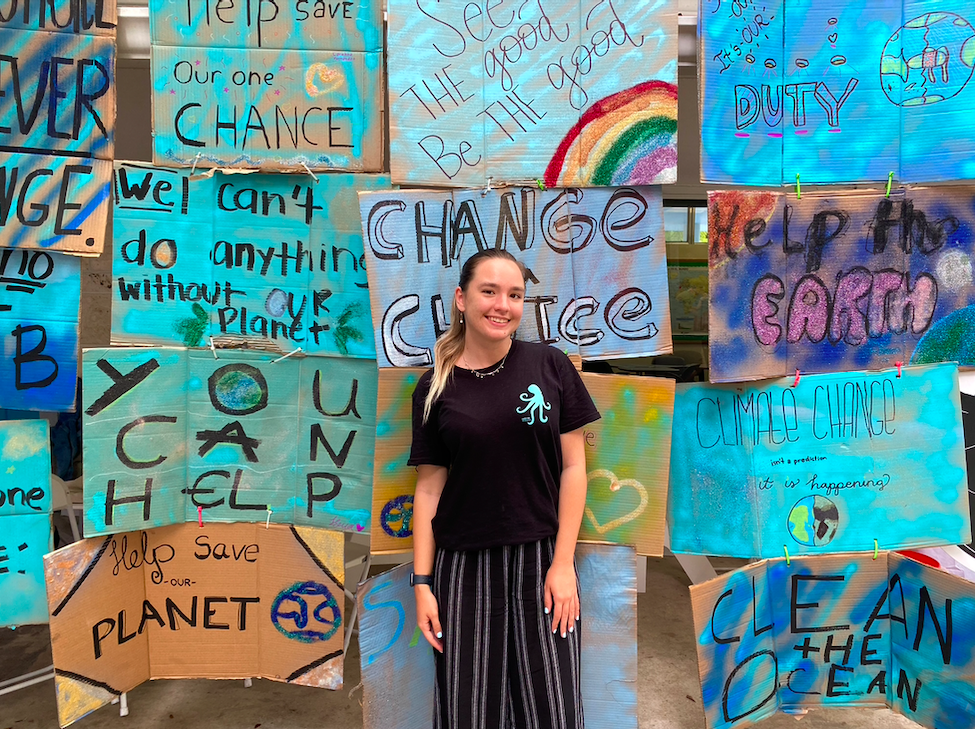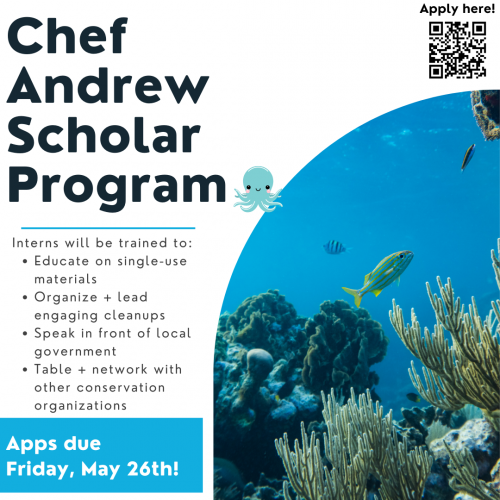Written by: Amanda di Perna
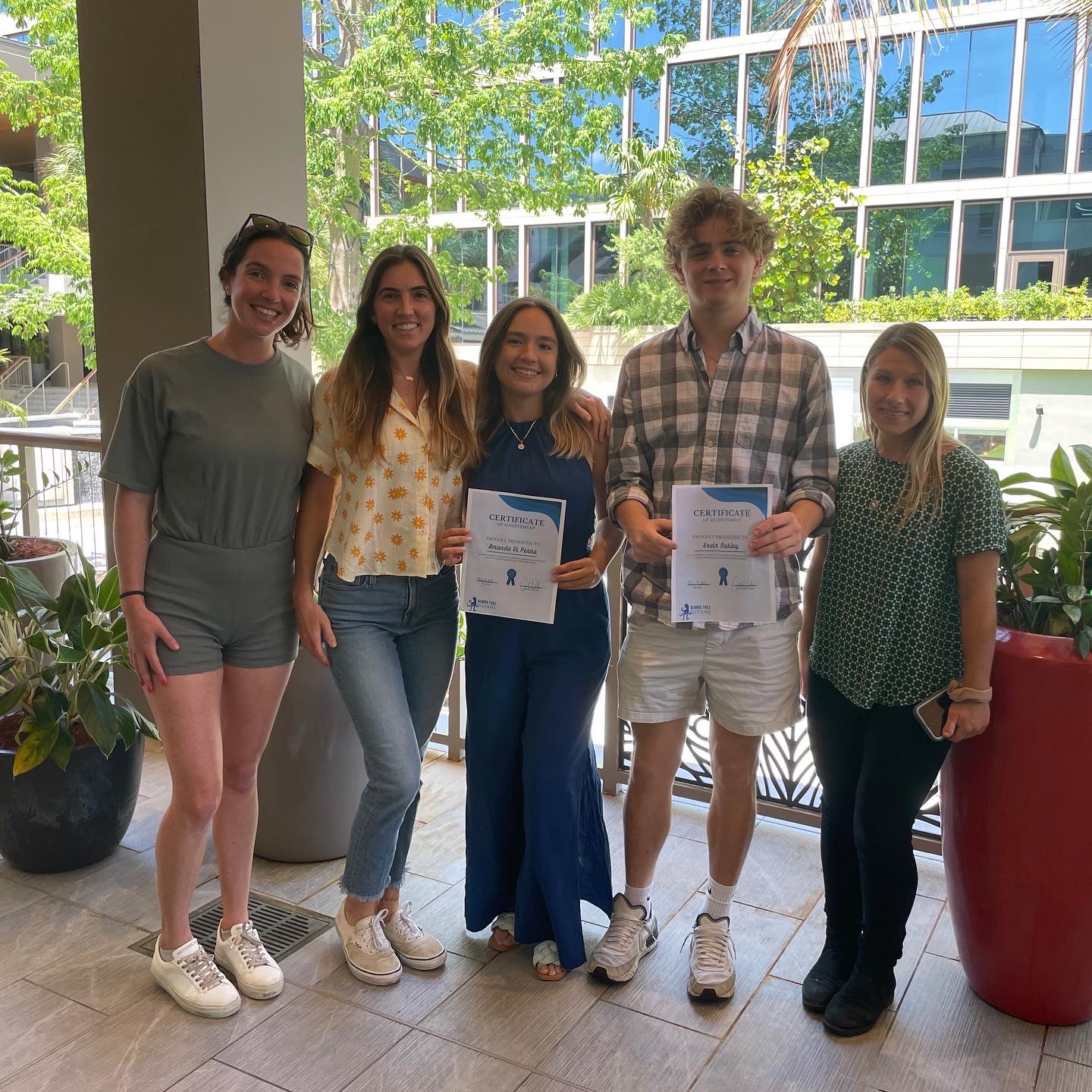
The Chef Andrew Scholar Program is a paid six-month internship for college students based in South Florida who are passionate about engaging with their community through education and outreach to address the plastic pollution crisis.
When my inboxes were flooded with forwarded messages about an internship opportunity with Debris Free Oceans (DFO), I took that as a sign that the Chef Andrew Scholar program was meant for me. I had spent my first two years as a marine biology undergrad at Florida International University organizing coastal cleanups across Miami-Dade, delivering plastic pollution talks to various local groups, and researching the intricacies of the plastic pollution crisis. As I read more about the Chef Andrew Scholar Program, I was amazed by how perfectly it aligned with my passion and interests. I was moved by the story behind the creation of the program and found it to be a beautiful way to honor the life of Chef Andrew Michael Alessi. I applied straight away, eager for the chance to be mentored by waste reduction champions, gain experience in working for a non-profit organization, and make a positive difference in my community. I knew this was an opportunity that could take my skills in marine conservation to the next level.
The day I was welcomed to the DFO team, I was ecstatic. The environment that is cultivated by the people that bring DFO’s mission to life is one filled with joy and excitement. Everyone has a contagious energy that makes you confident that you can accomplish a feat as ambitious as eradicating marine debris. It is an amazing feeling to be surrounded by people that share your passion, including my fellow Chef Andrew Scholar, Kevin Oakley.
Entering the Chef Andrew Scholar program, I thought I knew a lot about the plastic pollution crisis, but I was surprised to realize how much I didn’t know. As part of the training process, we are assigned several incredibly educational readings, viewings, and podcasts that open your eyes to how extensive and alarming the issue truly is. Within a month I felt as though I was a walking encyclopedia of marine debris knowledge, knowing everything from the history of plastics to the intersections between plastic pollution and social justice.
Education
Together, Kevin and I conducted 13 educational talks, reaching nearly 400 students, that ranged from elementary through college level.
Engaging with communities through education is just one of the many ways Debris Free Oceans is involved in helping solve the plastic pollution crisis. To me, education is the most powerful tool to bring about change. Many do not know about the ins and outs of the plastic pollution crisis; therefore, it is our responsibility to spread the word so that everyone can make informed consumer choices that benefit the health of their environment and community.
Public speaking can be nerve-wracking, but upon graduating from the Chef Andrew Scholar program, I can now speak to large crowds with confidence. It didn’t happen overnight; I might have practiced our “Beyond Our Oceans” talk 100 times before I delivered it to my toughest audience – the DFO team. This presentation covers the history of plastics and marine debris, marine debris’ impacts on ecosystems, the economy and the health of our residents, and actions each person can take to reduce the amount of waste in their own lives. Following our talks, most students indicate that they now know a lot about plastics, waste, and/or marine debris, and that they will change their behaviors/actions as a result of the educational experience. Receiving this feedback makes me certain that our youth will lead us to a more sustainable future if we continue to inspire them and provide them with the tools to get there.
Beyond the classroom, I developed an educational program for Surfrider Miami’s SEAS program, where I converted a traditional PowerPoint presentation into a flipbook that could be taken to the beach. I also hosted a workshop at the Miami Youth Climate Summit where I taught attendees how to turn an old t-shirt into a tote bag. Not only so, but I shared what I know about plastic pollution with nearly everyone I know, so now the people around me are actively engaged in reducing their waste and continuing to spread the word.
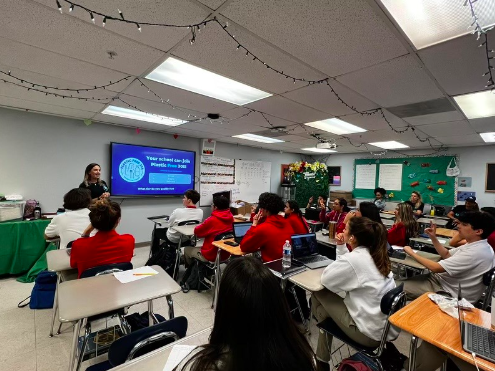
Delivering a talk to Doral Academy’s Green Club
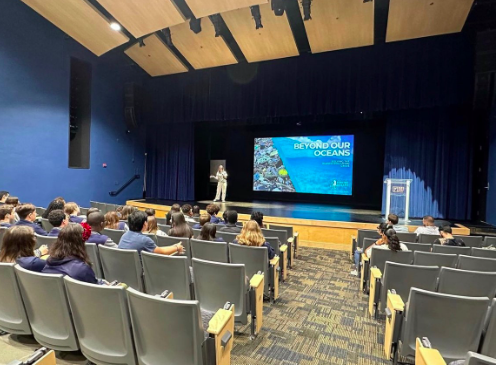
Beyond Our Oceans Talk with MAST @ FIU and Society for Women in Marine Science FIU club
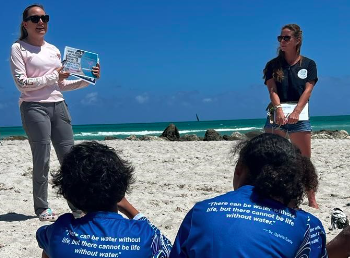
No computer? No problem! We can learn about plastic at the beach, too!
Cleanups
Kevin and I organized 18 cleanups across South Florida, including locations in North Miami, Miami Beach, and Key Biscayne.
Every cleanup makes a difference. The largest cleanup I helped organize as a Chef Andrew Scholar removed nearly one ton of marine debris from the Miami coastline. Even the cleanups that remove 20 pounds of marine debris have a lasting impact not only on our environment, but the mindsets of the people that interact with the cleanup. Cleanups are just as educational as the talks we deliver in classrooms, because people have the opportunity to witness South Florida’s pollution problem first-hand.
Cleanups are also FUN. From yoga cleanups to cleanups with live DJs, what better way to spend a weekend than enjoying South Florida’s beautiful nature surrounded by people connected by their desire to protect it?! Helping people realize taking care of our ocean is just as fun as enjoying it gives me the fuel to keep hosting more cleanups.
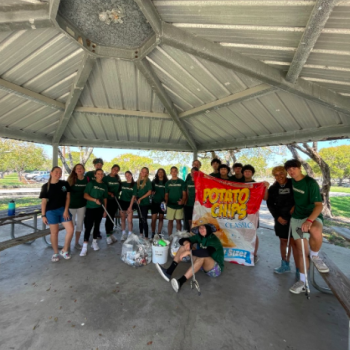
Beach cleanup at Crandon Park with Westminister High School
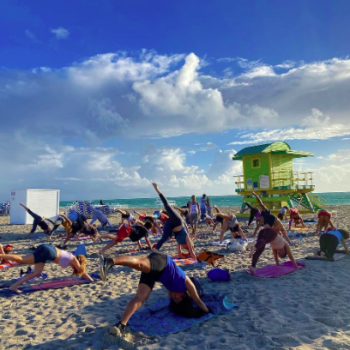
Sunrise yoga beach cleanup at South Beach with Lightrail Yoga and UM RSMAS’ Sustainability by the Sea
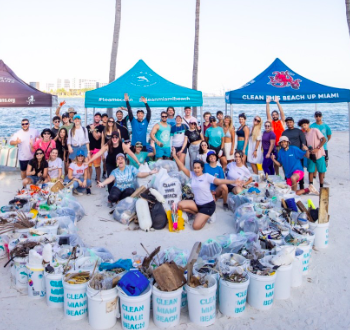
Clean the Beat cleanup at Bayfront Park with Clean Miami Beach, Clean This Beach Up, Ultra, and Volunteercleanup.org
Zero-Waste Lifestyle Events
Kevin and I attended 8 lifestyle awareness events where we showed over 400 people how they could “party with a purpose.”
Zero-waste living is possible, and DFO’s lifestyle awareness events help inspire others to live closer to this lifestyle. From watching Argentina win the World Cup from a floating LED screen to dancing the night away at Ultra Music Festival’s Eco Village, I lived it up as a Chef Andrew Scholar, all while remaining plastic free. Bringing sustainability into spaces where you would least expect it, helps sustainable living gain popularity until it becomes the new normal. Through sustainable events such as Eco Fest, we can prove to businesses that there is a demand to transition towards more sustainable practices, and that this transition is feasible.
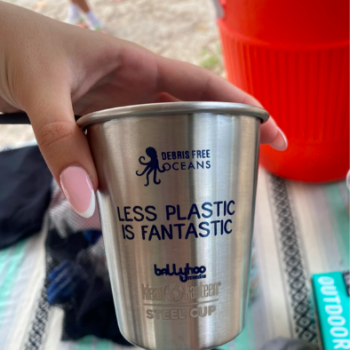
Reusable cup provided at World Cup Finale Watch Party’s open bar
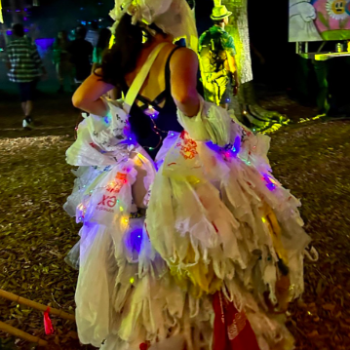
The infamous DFO bag monster at Ultra Music Festival
How has my experience as a Chef Andrew Scholar contributed to the life cycle of plastics?
The best way to tackle the plastic pollution crisis is to stop the flow of plastics at the source. Plastic is harmful no matter where it ends up – whether it be the ocean or a landfill.
As Chef Andrew Scholars, Kevin and I reached over 1,000 people across our various educational talks, cleanups, and lifestyle awareness events. That means, over 1,000 people are now at least slightly more conscious about the waste they produce, and hopefully inspired to commit to producing less waste. Following our educational talks, many students indicated that they will now commit to using a reusable water bottle and bringing a reusable bag. If even half the people we reached commit to those two simple actions, think about how many plastic bottles and bags we are preventing from causing harm to our health and environment.
We don’t expect everyone to immediately halt all waste production, because we understand that achieving a zero-waste lifestyle takes time. That is why we also strive to show others what they could do with the waste they do come across before sending it to a landfill or recycling it. When it comes to repurposing trash, the possibilities are endless. Plastic bottles could be turned into bird feeders, and t-shirts can be turned into tote bags to hold groceries, to name a few!
And when waste does make its way into our environment, we are there to pick it up. Plastic does not break down it only breaks apart, so if it is not removed, it will remain in our environment for hundreds of years. Every piece of marine debris that is removed counts, whether it be a 1 mm piece of microplastic, or 50 pounds of rope.
In my own life, I have significantly reduced the amount of waste I produce. My reusable water bottle, cutlery kit, and tote bags, go with me everywhere I go which also sparks conversation and encourages others to do the same. My loved ones know better than to buy me balloons or glitter, as we work towards a cleaner planet.
In my experience, the more you learn about the plastic pollution crisis, the more concerned you become about the issue, and the more compelled you are to do something about it. As a Chef Andrew Scholar, I strived to inspire local communities to responsibly manage the lifecycle of plastics and waste. If you are an undergraduate student motivated to do the same, applications to join the program are open until Friday, May 26.


